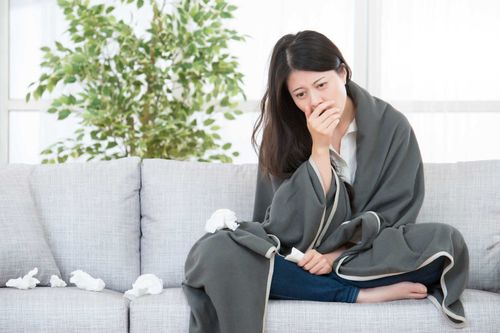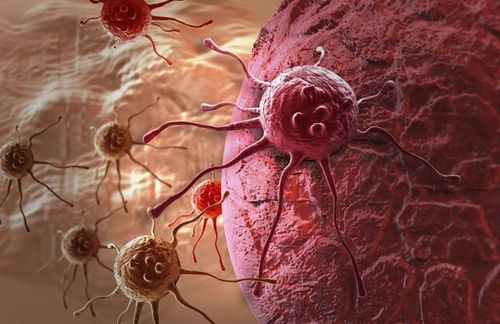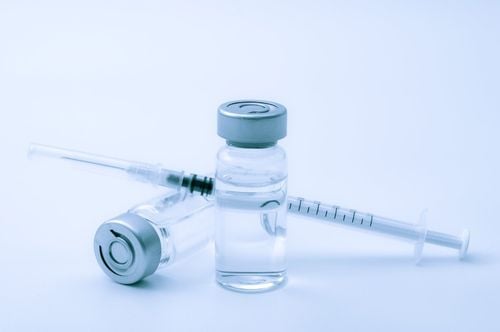This is an automatically translated article.
The article is written by doctors of Internal Oncology Department, Vinmec Times City International General Hospital.
The immune system is essential for life. Without an immune system, the body will be easily attacked by bacteria, viruses, parasites, etc.. the immune system keeps us healthy when exposed to pathogens. The immune system is present throughout the body and involves many types of cells, organs, proteins, and tissues. People with cancer undergoing treatment such as chemotherapy, radiation therapy... also often have weak immune systems.
1. How does breast cancer affect the immune system?
A new study analyzed the long-term effects of chemotherapy on breast cancer patients. Results showed that chemotherapy weakened the immune system for at least 9 months after treatment. This can make the patient unable to protect against common infections such as pneumonia and tetanus even though they have been vaccinated before.
The study was published in the journal Breast Cancer Research - by the University of Leeds and Hospitals NHS Trust in the UK.
One of the authors, Thomas Hughes, associate professor at the Faculty of Medicine at Leeds, said: “We were surprised to see that the effects of chemotherapy last so long.”
Breast cancer is a type of cancer. It is most common in women and takes more than half a million lives worldwide each year.
The disease is treated with multimodality that includes surgical removal of the tumor combined with other methods such as hormone therapy, radiation therapy and/or chemotherapy to destroy remaining cancer cells. Chemotherapy drugs attack rapidly dividing cancer cells. But other cells, such as those in the bone marrow where white blood cells are made, also divide and are likely to be affected by chemotherapy.

Hóa trị liệu làm suy yếu hệ miễn dịch trong vòng ít nhất 9 tháng sau khi điều trị
2. Some lymphocytes and antibodies are weakened within 9 months
Researchers followed 88 patients with primary breast cancer for periods ranging from 2 weeks to 9 months after finishing chemotherapy. They monitor levels of the immune system, including antibodies and a group of white blood cells called lymphocytes. The data showed that the levels of T, B lymphocytes and natural killer NK cells, which protect the body against infection, were significantly reduced after chemotherapy.
This effect is short-term for most types of lymphocytes, as these cells return to pre-chemotherapy levels after 9 months. But B cells and helper T cells only reached 65% of pre-chemotherapy levels after 6 months, and remained at that level for the next 3 months. B cells make antibodies, and helper T cells also play a part in that task.
Antibodies are important to help the immune system identify and eliminate pathogens such as viruses and bacteria. There are different antibodies to different pathogens. The team also found that levels of antibodies against the bacteria that cause tetanus and pneumonia decreased after chemotherapy and remained at 9 months.
3. Immunosuppressive effects are different for different chemotherapy regimens
When comparing different chemotherapy therapies, the team found that an anthracycline-only regimen reduced the number of B cells and helper T cells compared to baseline, but almost recovered. normal levels after some time from the end of treatment.
However, after chemotherapy including anthracycline followed by a taxane, the levels of B cells and helper T cells recovered very slowly
The authors note that smoking also had an effect, with some immune cells recovering only 50% of their pre-chemotherapy level in smokers, while reaching 80% in non-smokers.
The researchers suggest "It is necessary to take into account the immune health of breast cancer patients when planning treatment, but more research is also needed to determine whether this improves patient outcomes or not. are not."

Cần phải tính đến sức khỏe miễn dịch của bệnh nhân ung thư vú khi lập kế hoạch điều trị
4. What to do to improve the immune system after chemotherapy?
Autologous enhancement immunological therapy (AEIT) is a solution that meets these requirements.
The principle of AEIT therapy is to separate immune cells from the patient's peripheral blood, selectively culture them in a special medium to increase the number of immune cells, and then retransfuse these cells into the patient's own body. This therapy can use many different types of immune cells such as: Natural Killer cells (NK), cytotoxic T cells (CTL) ...
Since October 2018, The Ministry of Health has allowed the application of autologous immunotherapy at Vinmec Times City International General Hospital - the first place in Vietnam to apply this method in treatment.
Vinmec has developed a standard procedure, ensuring safe immune cell transfusion, without serious complications, and optimal efficiency. Vinmec has given Vietnamese cancer patients the opportunity to be detected early, examined and treated in the best conditions, at a reasonable cost without having to go abroad.
Customers can go directly to Vinmec Times City to visit or contact hotline 0243 9743 556 for support.
MORE:
Process of performing autologous immune system therapy to support cancer treatment at Vinmec Opportunity to reverse cancer with autologous immunotherapy according to Japanese technology New therapy in treatment Cancer can be done in Vietnam without going abroad













